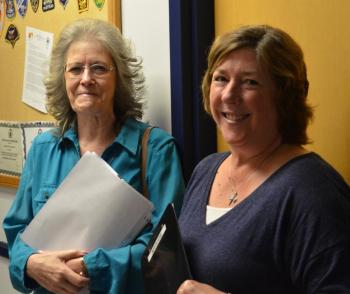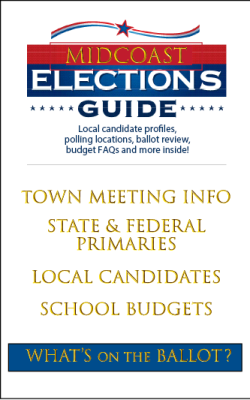All hail the Municipal Clerk: Fair, patient, accurate, they are the ‘Remembrancers’
The unsung heroes in all Midcoast towns are the municipal clerks. You may not know them, but they probably know you, or at least, your vital birth, marriage and death stats. These are the quiet, efficient overseers of local government, and their duties may range from taking minutes at budget committee meetings to ensuring that elections proceed without a hitch. Both tasks are significant, and glitches in either can spell legal trouble for the city or town.
Clerks, and their deputies, preside over the front offices as keepers of the town. Most have longevity on the job, and have the institutional memory that is fundamental to municipal integrity.
Don’t ask the town manager or planner what happened three years ago, or who sat in what chair. Ask the clerk; he or she will keep a running mental log of local history that extends back not just through their term, but likely to those who occupied the same chair decades prior.
“Over the years, clerks have become the hub of government, the direct link between the inhabitants of their community and their government,” according to the International Institute of Municipal Clerks. “The clerk is the historian of the community, for the entire recorded history of the town (city) and its people is in his or her care.”
The clerk must be versatile, alert and accurate, said political scientist Professor William Bennett Munro, in 1934.
The clerk must also ensure that every citizen has the right to vote, and Maine’s Bureau of Corporations, Elections and Commissions is telling the 500 municipal clerks in the state to anticipate a 100 percent voter turnout Nov. 8, when U.S. citizens will choose their next president.
Should that happen, it will be unprecedented. According to Rockport Town Clerk Linda Greenlaw, the highest presidential election turnout in her town was in 2012, when 84.6 percent of registered voters cast their ballots.
It would also beat the record in Hope, which saw almost 90 percent of its voters (1,000) cast ballots in 2012.
The high turnout is not just because the race is down to Hillary Clinton versus Donald Trump. It is also due to the growing number of citizens voting via absentee ballot. Greenlaw, Oxton, Belfast City Clerk Amy Flood and Rockland City Clerk Stuart Sylvester attribute different reasons to this: State election rules have better accommodated the absentee voting process, and more people who formerly would not have bothered going to the polls are sending completed ballots back to the municipal office.
Midcoast clerks are reporting that nearly half of their voters are now casting absentee ballots, no matter if they are in the Congo, or just down the street.
Many are people who don’t want to bother to go to the polls, said Sylvester.
“They don’t want to wait in line,” he said. “They don’t want to take the time out of their days to go to the polls.”
While this makes it easier for voters to select their leaders, it also piles on more work for clerks and staff. As early as August, offices were receiving daily emails from the state about election procedures and responsibilities.
“Everything has to be done right,” said Hope Town Clerk Bobbie Oxton, who is about to experience her first presidential election presiding as town clerk. “There’s no making mistakes.”
But she says the Bureau of Elections represents quite possibly the friendliest Augusta agency.
“They are seriously the nicest people I’ve ever had to work with,” she said.
The Remembrancers
The municipal clerk is the oldest of public servants in local government, along with the tax collector, according to the International Institute of Municipal Clerks.
The profession traces back before Biblical times. The modern Hebrew translation of Town Clerk is “Mazkir Ha’ir” which means city or town Reminder. The early keepers of archives were often called Remembrancers, and before writing came into use, their memory served as the public record.
Curse be on anyone who sought to deceive the people, according to ancient Greece records. The enforcer of that was the city clerk, who literally cast the decree.
In England, the Remembrancer was called upon to remind councilors what transpired at previous meetings, since the meeting of early councils were not recorded in minutes.
When colonists settled Plymouth, they appointed a clerk to keep vital records for birth, marriages and deaths for the church, as well as various other records of appointments, deeds, meetings, and the election of officers at annual town meeting.
The office of town clerk of Wethersfield, Conn., was established in 1639 and that person was to “keep a record of every man’s house and land,” and to present “a fairly written” copy of such to every General Court to be recorded by the secretary of the colony, the institute said.
Clerks were, and still are: “the hub of government, the direct link between the inhabitants of their community and their government. The clerk is the historian of the community, for the entire recorded history of the town (city) and its people in his or her care.”
Tip your hat to the clerk
Like Oxton, Belfast City Clerk Amy Flood is also preparing for her first presidential election. She has two voting locations in her city of wards — the United Methodist Church and the Belfast Boathouse. She also has an army of volunteers, 28 of them, plus staff, to ensure orderly process.
“Be patient,” she simply asks. “A lot of people are coming out to vote.”
Rockland’s Sylvester, on the other hand, has been on the job for 28 years and has seen his share of presidential elections. He’s not fond of them.
“Most people don’t understand the complexity of putting on an election,” he said. “They want what they want when they want it and don’t understand why they can’t get it when they want it. But they have to get it when we get to it.”
It is a massive job to pull off an election, and absentee ballots have increased the workload.
“The 30 days prior to the election we spend every day, eight hours a day, doing nothing but absentee ballots,” said Sylvester. “It takes up the vast majority of our time.”
He is anticipating at least 1,500 absentee ballots in this coming election, in a city of 4,600 voters.
Camden and Rockland staff will be processing their absentee ballots on the Saturday prior to the election, “just to get the ones we’ve received up to that point,” said Sylvester.
The bottom line lies in ensuring the security and integrity of that ballot, said Sylvester. “There’s no room for error.”
Rockland, with its four staff members, will run the polls. Their help will be the temporary election clerks, who are hired, 10 to 12 of them working four separate shifts, for $7.50 an hour.
For Linda Greenlaw in Rockport, Election Day 2016 will be a challenge, but she is looking forward to it.
“A lot of residents I don’t normally see all of a sudden show up,” she said.
Those residents are the voters, the ones for whom the clerks work so hard to ensure municipal integrity.
“We try,” said Sylvester.
Politics leaves the municipal clerks alone, for the most part. They are the foundation of process.
“Everything we do is outlined in municipal charter,” said Sylvester. “If that’s what the law says, you do it. It’s surprising to say that will all the involvement we have in the process of politics and government, we have an apolitical position.”
Amen to that.































